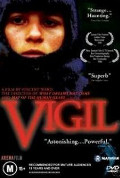
Directed by
Vincent Ward
86 minutes
Rated M
Reviewed by
Bernard Hemingway

Vigil
Vincent Ward was 27 years old when he made this, his debut feature, a story about 11 year old, Toss (Fiona Kay), who lives on a remote farm in a verdant valley deep in rural New Zealand with her father (Gordon Shields), mother (Penelope Stewart ) and grandfather (Bill Kerr). When she witnesses her father’s death while out herding sheep an enigmatic stranger Ethan (Frank Whitten) retrieves her father’s body and eventually begins a relationship with her mother/.
Ward is evidently a devotee of European film, particularly that of Ingmar Bergman - hence the rural isolation, brooding silences, storm-blasted winter landscapes, enigmatic characters and faux medievalism. Trouble is that whilst the film is technically accomplished with striking visuals by cinematographer Alun Bollinger, it comes across as a self-conscious exercise in cinema poetics, too obviously derivative (one can't help but wish one was watching the real thing, say Bergman's The Virgin Spring) and unable to integrate its metaphysical tendencies with its mundane setting.
Whilst realism may not be the point, unlike the Swedish master's work, there is also a slightly absurdist element that however tends towards the comical, something manifested particularly in Bill Kerr's Spike Milliganish character that suggests the director is not entirely sure of his footing.
Originally called "First Blood, Last Rites" but re-named after the release in 1982 of Sylvester Stallone's First Blood it was the first New Zealand film to be shown in competition at Cannes and looks forward to Jane Campion's The Piano (1993), which shares in its taste for damp, Gothic melancholy. Ward continued the approach with his next film The Navigator: A Medieval Odyssey (1988) with somewhat more success.
Want something different?





